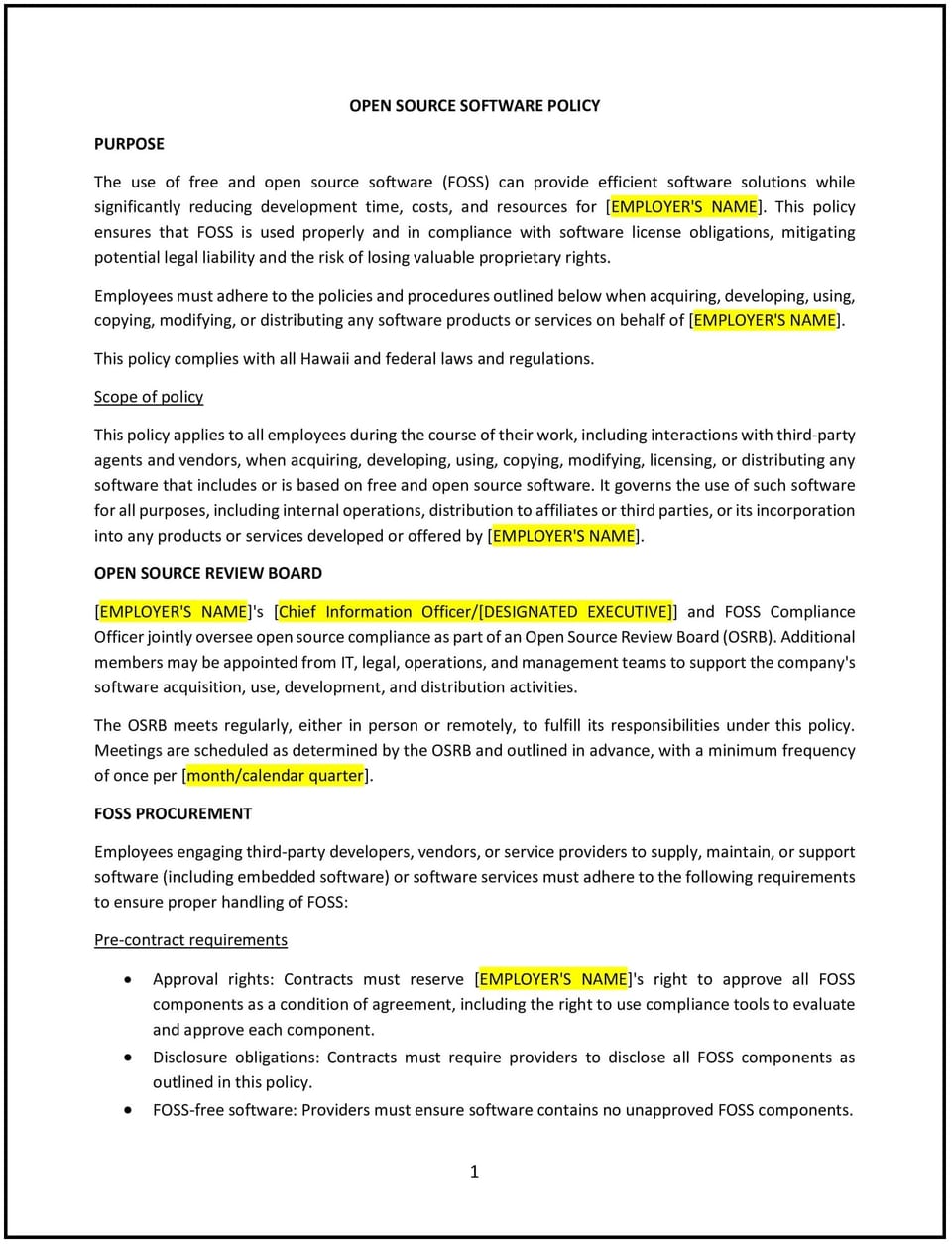Open source software policy (Hawaii): Free template

Open source software policy (Hawaiʻi)
An open source software policy helps Hawaiʻi businesses establish guidelines for using, contributing to, and managing open source software (OSS) in their operations. This policy outlines procedures for evaluating, implementing, and maintaining OSS, while addressing Hawaiʻi’s unique business environment and cultural considerations. It is designed to promote innovation, reduce costs, and ensure responsible use of open source technologies.
By implementing this policy, businesses in Hawaiʻi can leverage the benefits of open source software while minimizing risks related to licensing, security, and intellectual property.
How to use this open source software policy (Hawaiʻi)
- Define open source software: Provide a clear definition of OSS and examples of common licenses, such as MIT, Apache, or GNU General Public License (GPL).
- Establish evaluation criteria: Outline steps for assessing OSS before adoption, including reviewing license terms, security risks, and compatibility with existing systems.
- Address contribution guidelines: Specify whether employees are permitted to contribute to OSS projects and provide procedures for obtaining approval.
- Set usage rules: Provide guidelines for using OSS in business operations, including proper attribution, compliance with license terms, and documentation.
- Communicate the policy: Share the policy with employees during onboarding and through internal communications to ensure awareness and understanding.
- Train employees: Educate staff on the policy’s guidelines, including how to evaluate, use, and contribute to OSS responsibly.
- Monitor compliance: Regularly review OSS usage and contributions to ensure adherence to the policy and address any issues promptly.
- Review and update the policy: Regularly assess the policy’s effectiveness and make adjustments as needed to reflect changes in technology, licensing, or business needs.
Benefits of using this open source software policy (Hawaiʻi)
This policy offers several advantages for Hawaiʻi businesses:
- Promotes innovation: Open source software provides access to cutting-edge technologies and collaborative development opportunities.
- Reduces costs: Using OSS can lower software licensing and development expenses, making it an attractive option for businesses.
- Enhances flexibility: OSS allows businesses to customize and adapt software to meet their specific needs.
- Supports transparency: Open source software enables businesses to review and modify code, improving security and reliability.
- Aligns with legal standards: The policy helps businesses comply with OSS licensing requirements and intellectual property laws.
- Encourages accountability: Employees understand their responsibilities for using and contributing to OSS responsibly.
- Builds trust: A clear and structured policy demonstrates the business’s commitment to ethical and responsible use of technology.
Tips for using this open source software policy (Hawaiʻi)
- Communicate the policy effectively: Share the policy with employees during onboarding and through regular reminders, such as emails or training sessions.
- Provide training: Educate staff on the policy’s guidelines, including how to evaluate, use, and contribute to OSS responsibly.
- Use tools: Implement software tools to track OSS usage, licenses, and compliance across the organization.
- Monitor compliance: Regularly review OSS usage and contributions to ensure adherence to the policy and address any issues promptly.
- Be transparent: Clearly explain the policy’s purpose, benefits, and expectations to employees to build trust and cooperation.
- Review the policy periodically: Update the policy as needed to reflect changes in technology, licensing, or business needs.
Q: Why should Hawaiʻi businesses adopt an open source software policy?
A: Businesses should adopt this policy to promote innovation, reduce costs, and ensure responsible use of open source technologies.
Q: What is open source software?
A: Open source software is software with source code that is freely available for use, modification, and distribution under specific licenses.
Q: How should businesses evaluate open source software before adoption?
A: Businesses should review license terms, assess security risks, and ensure compatibility with existing systems before adopting OSS.
Q: Can employees contribute to open source projects?
A: Employees may contribute to OSS projects if approved by the business, following the procedures outlined in the policy.
Q: What are the risks of using open source software?
A: Risks include non-compliance with license terms, security vulnerabilities, and potential intellectual property issues.
Q: What training should businesses provide to employees?
A: Businesses should educate staff on how to evaluate, use, and contribute to OSS responsibly, including understanding license terms and compliance requirements.
Q: How often should the policy be reviewed?
A: The policy should be reviewed annually or as needed to reflect changes in technology, licensing, or business needs.
This article contains general legal information and does not contain legal advice. Cobrief is not a law firm or a substitute for an attorney or law firm. The law is complex and changes often. For legal advice, please ask a lawyer.


